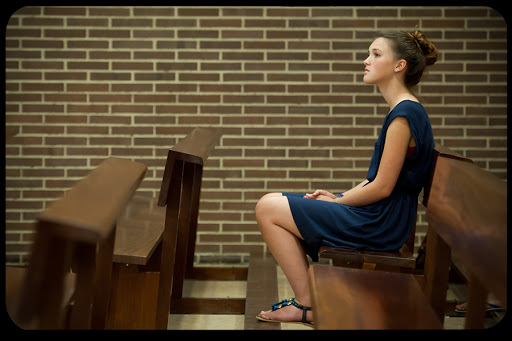“Angels affect us oft, and worshipp’d be;“Be humble, impotent reason! Be silent feeble nature!” – Blaise Pascal
Still then, to where thou wert, I came,
Some glorious nothing did I see.” – John Donne, from Air and Angels
I have sat before the Eucharist and known, in my deepest self, that I understood, but I did not believe.
I am a convert to Catholicism, gently led to truth as an undergraduate in the philosophy department of Saint Louis University, now 20 years ago. It was the vibrancy of the lives of my Catholic professors and peers that attracted me, but it was St. Thomas Aquinas that convinced me, in his meticulous way. I had the joy of discovering that the teachings of the Church were not only rational, but compatible with the truth partially revealed by Aristotle, that pagan intellectual giant. I could have my cake and eat it, too! Salvation and intellectual rigor!
But in the years that followed, I was beset with doubt and I felt ice cold. In Adoration before the Eucharist, I could not dwell in His Presence because I had no sense of His Presence. I had only the paucity of a tidy Aristotelian argument about the bread and wine changing “substance,” to become the Body and Blood, while their “accidents” remained unchanged, which is why Christ Himself still appeared to be humble bread and wine. That explanation of the miracle of the Eucharist is intellectually sufficient and satisfying, but it is cold comfort on your knees. My mind accepted the argument, but my heart lacked passion.
I was in serious trouble, because when you come to faith through reason, you can be ushered out through the same door. If the Real Presence becomes irrational and unacceptable, then why not the Incarnation and Resurrection themselves? Angels, demons, apparitions of Mary, miraculous healing easily become embarrassing rantings of superstitious lunatics.
But then, because God is so good, He allowed reason itself to show me its inherent limitations. The natural world abounds in mystery and offers countless examples of how what seems absurd is real. We have, for example, come to understand that the matter we can observe makes up only 4.9% of the matter of the universe. Dark matter, which does not react to light, makes up another 26.8%. The rest of the universe seems to be without substance at all and, thus, is completely unobservable. We have learned that how a butterfly sees the world is so different from our experience (those little creatures can see ultraviolet light!), that to trust our senses to reveal the totality of truth is just foolish. Reason’s ability to reveal truth is limited by the information we can provide to our reason through our senses. And our senses give us very incomplete data.
More to read: How beeswax candles opened up my eyes to the beauty of the Mass
Ultimately, the greatest gift God gives to us through our reason is the stark realization that nothing is exactly what it seems. Once I hit that brick wall and understood that I was still just a baby with the blurred vision of a newborn, the life of faith opened up again. Doubt in God, properly examined, led me simply to doubting myself and my own ability to perfectly comprehend the mysteries of the universe.
That is a wondrous gift to unwrap. Suddenly, everything seemed possible again. The idea of an angel as a spiritual being without substance becomes a little less crazy when you know that some 68% of the known universe is without substance. The bleak, oppressive nothingness of Hell becomes somewhat more comprehensible when you contemplate a black hole – admitting no light, sucking in and destroying anything that comes too close to its abyss. The miracle of the consecration becomes palpable with the realization that time itself is illusory. When Christ said, “This is my Body,” He spoke, is speaking and will speak those words in a singular moment and we can be with Him in that singular moment for eternity.
More to read: How Does Believing in the Eucharist Make Us Better Scientists?
When I shrugged my shoulders and admitted that I didn’t have the first clue what was real, my heart was able to start making its own observations about reality. Most importantly, I could begin to experience authentic love – not as a feeling, but as something real, lived and chosen. That is what is required to adore the Eucharist, to experience and believe the Incarnation and the Resurrection or to allow yourself to believe, however ridiculously, in the companionship of an angel. That is what I needed to get a glimpse of how St. Maximillian Kolbe could say, “Take me instead. He has a wife and children.” Love lies beyond reason, makes us foolishly passionate and tells us that the impossible is, absurdly, the most real thing.
“Everyone who loves has been born of God and knows God.” 1 John 4:7

